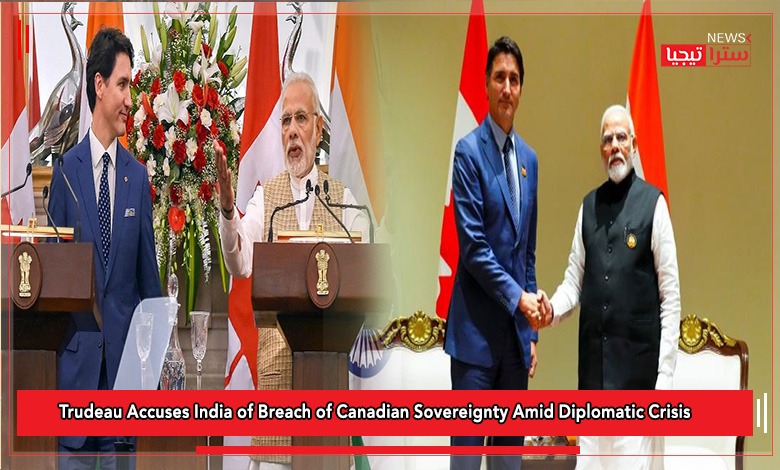Department of Security and Military Strategic Research and Studies 17-10-2024
Canadian Prime Minister Justin Trudeau has labeled India’s actions as a “horrific mistake” in the context of a deepening diplomatic conflict related to the murder of Sikh separatist Hardeep Singh Nijjar in British Columbia. This allegation comes amidst growing concerns over India’s purported campaign of intimidation against Indian exiles in Canada.
During a public inquiry on foreign interference held on Wednesday, Trudeau criticized the Indian government for rejecting collaborative efforts and escalating tensions that led to the recent mutual expulsion of high-ranking diplomats from both nations. “We are not seeking confrontation with India,” Trudeau stated. “However, the Indian government grievously miscalculated by attempting such aggressive interference in Canada’s safety and sovereignty. It is imperative that we act to safeguard Canadians.”
In his testimony, Trudeau provided insights into the ongoing saga, emphasizing that Canada had no intention of jeopardizing its valuable relationship with India. However, he noted that the circumstances surrounding Nijjar’s assassination last June revealed “clear and increasingly evident indications” of a violation of Canadian sovereignty by Indian authorities.
The prime minister made several controversial remarks, claiming that classified intelligence suggested some members of the opposition Conservative Party might be at risk of being involved in foreign interference activities. His statements came during a tumultuous week in which Canadian law enforcement accused Indian diplomats of collaborating with organized crime to target Sikh activists within Canada—a claim that India dismissed as “ludicrous.”
In response to Trudeau’s allegations, a spokesperson for India’s Ministry of External Affairs remarked, “The statements made today only reaffirm our position: Canada has provided no substantial evidence to support its serious accusations against India and its diplomats. The deterioration of India-Canada relations is solely the responsibility of Prime Minister Trudeau.”
Trudeau clarified that Canadian officials had shared intelligence with their Indian counterparts, but reported a lack of cooperation from the Indian side. “The decision by the RCMP to proceed with this announcement was fundamentally about public safety and disrupting a pattern of violence, including drive-by shootings and extortion linked to criminal activities,” he explained.
The prime minister revealed that Canada first raised concerns about Nijjar’s murder during the 2023 G20 summit in New Delhi. He recounted that when he confronted Indian Prime Minister Narendra Modi about possible involvement of Indian security agencies, Modi countered that Canada should intensify its actions against Sikh separatists.
Despite attempts to engage with Indian officials, Trudeau indicated a clear disinterest on their part to de-escalate tensions. Since Trudeau publicly disclosed “credible allegations” suggesting Indian government links to Nijjar’s murder, the diplomatic rift has intensified, leading to the expulsion of six senior Canadian diplomats by India in response to Canada’s actions.
As Canada continues to address this crisis, it seeks support from its allies to condemn India’s alleged transgressions. Recently, UK Prime Minister Keir Starmer expressed the importance of India cooperating with Canadian legal authorities in light of the serious allegations, affirming the UK’s confidence in Canada’s judicial system.
With the scope of Canada’s accusations widening, it has become increasingly challenging for its allies within the Five Eyes intelligence alliance to remain silent. Recent reports have indicated that Indian diplomats in Canada were allegedly involved in orchestrating a campaign of intimidation and extortion against the South Asian community, resulting in various violent incidents.
The U.S. has also asserted that India is not cooperating with Canada’s investigation, despite acknowledging Indian cooperation in a separate case regarding a plot against a Sikh separatist leader in New York.
During his testimony, Trudeau raised concerns about potential foreign interference within the Conservative Party, stating, “I have information regarding several parliamentarians and former candidates in the Conservative Party who may be compromised or at risk of being involved in foreign interference.” Conservative leader Pierre Poilievre has since challenged Trudeau to name the individuals allegedly involved, accusing the prime minister of attempting to divert attention from internal party conflicts and previous allegations of allowing foreign interference in Canadian elections.
Trudeau maintained that he does not leverage national security information for partisan gain, emphasizing the importance of integrity in handling such sensitive matters. Additionally, a parliamentary committee is set to conduct an emergency investigation into the allegations that Indian agents have participated in violent crimes on Canadian soil.
As the situation develops, the diplomatic rift between Canada and India raises critical questions about sovereignty, international relations, and the safety of communities impacted by geopolitical tensions.

